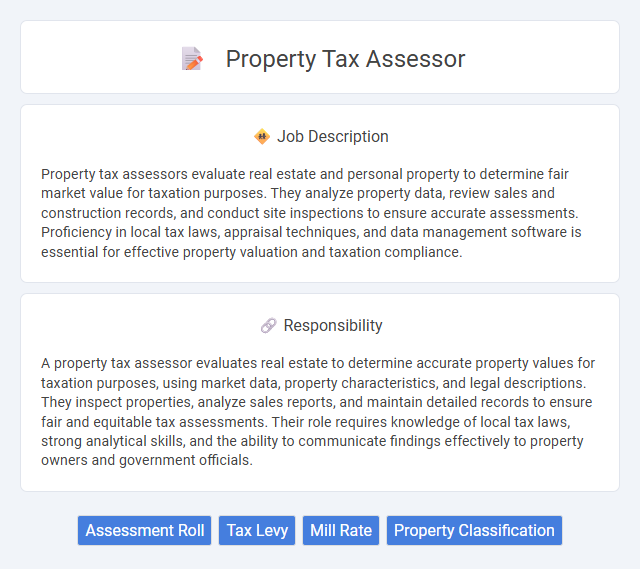
Property tax assessors evaluate real estate and personal property to determine fair market value for taxation purposes. They analyze property data, review sales and construction records, and conduct site inspections to ensure accurate assessments. Proficiency in local tax laws, appraisal techniques, and data management software is essential for effective property valuation and taxation compliance.
People with strong analytical skills and attention to detail are likely to be well-suited for a property tax assessor job, as it requires accurate property valuation and data interpretation. Those who can manage complex regulations and communicate effectively with property owners might find this role fitting their abilities. Individuals who prefer outdoor work or have difficulty with numbers and legal guidelines might encounter challenges in this position.
Qualification
Property tax assessors typically require a bachelor's degree in finance, business administration, or a related field, alongside strong analytical and mathematical skills. Certification or licensure, such as the Certified Assessment Evaluator (CAE) designation, significantly enhances career prospects and credibility in the field. Experience with property valuation techniques, real estate market trends, and proficiency in relevant assessment software tools are crucial for accurate tax assessments.
Responsibility
A property tax assessor evaluates real estate to determine accurate property values for taxation purposes, using market data, property characteristics, and legal descriptions. They inspect properties, analyze sales reports, and maintain detailed records to ensure fair and equitable tax assessments. Their role requires knowledge of local tax laws, strong analytical skills, and the ability to communicate findings effectively to property owners and government officials.
Benefit
Property tax assessors likely provide significant financial benefit by ensuring accurate valuations that help fund local services. Their expertise in property appraisal could contribute to fair tax distribution, minimizing disputes and increasing community trust. Improved assessment accuracy may result in optimized revenue collection for municipalities, supporting public infrastructure and services.
Challenge
Property tax assessor jobs likely involve challenges such as accurately evaluating diverse property values amidst fluctuating market trends and complex regulations. Assessors probably face difficulties in ensuring compliance with local tax laws while managing disputes from property owners. The role may require strong analytical skills and attention to detail to navigate data inconsistencies and maintain fair assessments.
Career Advancement
Property tax assessors evaluate real estate to determine taxable values for local governments, playing a critical role in public finance. Career advancement opportunities often include promotions to senior assessor, assessment supervisor, or director of the assessor's office, with potential to influence tax policy and community development. Gaining certifications such as the IAAO designation and acquiring expertise in appraisal software and property law significantly enhances career growth prospects.
Key Terms
Assessment Roll
Property tax assessors maintain the assessment roll by accurately appraising real estate values within their jurisdiction to ensure equitable property taxation. They collect and verify property data, update ownership records, and apply local tax laws to reflect changes in property status or market conditions. The assessment roll serves as a critical database for calculating property taxes, supporting transparency and compliance with municipal regulations.
Tax Levy
A property tax assessor evaluates real estate to determine its market value, which directly influences the Tax Levy imposed by local governments. This Tax Levy is the total amount of property taxes required to be collected for funding public services such as schools, infrastructure, and emergency services. Accuracy in property assessments ensures equitable Tax Levy distribution among taxpayers, maintaining balanced municipal budgets and public resource allocation.
Mill Rate
A property tax assessor evaluates real estate to determine its taxable value, which directly impacts the mill rate applied to calculate property taxes. The mill rate, expressed as the amount per thousand dollars of assessed value, is crucial for funding local government services and schools. Accurate assessments ensure fair tax distribution by aligning property values with the mill rate set by municipal authorities.
Property Classification
Property tax assessors analyze and classify real estate properties based on use, size, location, and physical characteristics to determine accurate tax values. Property classification categories include residential, commercial, industrial, agricultural, and vacant land, each with distinct assessment criteria affecting tax rates and exemptions. Accurate classification ensures equitable taxation and compliance with local and state tax regulations, directly impacting municipal revenue streams.
 kuljobs.com
kuljobs.com